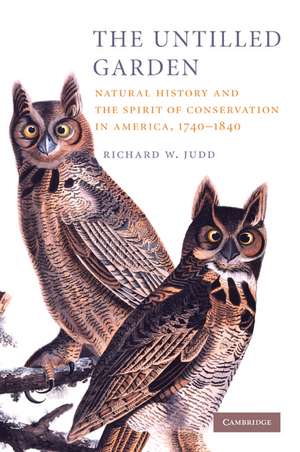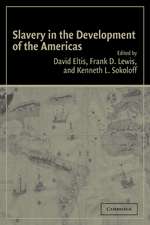The Untilled Garden: Natural History and the Spirit of Conservation in America, 1740–1840: Studies in Environment and History
Autor Richard W. Judden Limba Engleză Paperback – 21 iun 2009
| Toate formatele și edițiile | Preț | Express |
|---|---|---|
| Paperback (1) | 225.79 lei 6-8 săpt. | |
| Cambridge University Press – 21 iun 2009 | 225.79 lei 6-8 săpt. | |
| Hardback (1) | 640.12 lei 6-8 săpt. | |
| Cambridge University Press – 28 iun 2009 | 640.12 lei 6-8 săpt. |
Din seria Studies in Environment and History
-
 Preț: 137.74 lei
Preț: 137.74 lei -
 Preț: 188.70 lei
Preț: 188.70 lei -
 Preț: 234.83 lei
Preț: 234.83 lei -
 Preț: 156.89 lei
Preț: 156.89 lei -
 Preț: 204.55 lei
Preț: 204.55 lei -
 Preț: 147.64 lei
Preț: 147.64 lei -
 Preț: 243.02 lei
Preț: 243.02 lei -
 Preț: 201.67 lei
Preț: 201.67 lei - 14%
 Preț: 771.56 lei
Preț: 771.56 lei -
 Preț: 231.54 lei
Preț: 231.54 lei -
 Preț: 191.12 lei
Preț: 191.12 lei -
 Preț: 239.72 lei
Preț: 239.72 lei -
 Preț: 232.16 lei
Preț: 232.16 lei -
 Preț: 200.99 lei
Preț: 200.99 lei -
 Preț: 206.52 lei
Preț: 206.52 lei -
 Preț: 199.05 lei
Preț: 199.05 lei -
 Preț: 431.15 lei
Preț: 431.15 lei -
 Preț: 322.04 lei
Preț: 322.04 lei -
 Preț: 204.48 lei
Preț: 204.48 lei -
 Preț: 299.23 lei
Preț: 299.23 lei -
 Preț: 332.81 lei
Preț: 332.81 lei -
 Preț: 239.55 lei
Preț: 239.55 lei -
 Preț: 285.93 lei
Preț: 285.93 lei -
 Preț: 270.25 lei
Preț: 270.25 lei -
 Preț: 275.85 lei
Preț: 275.85 lei -
 Preț: 323.05 lei
Preț: 323.05 lei -
 Preț: 208.68 lei
Preț: 208.68 lei - 11%
 Preț: 432.64 lei
Preț: 432.64 lei -
 Preț: 252.69 lei
Preț: 252.69 lei -
 Preț: 278.72 lei
Preț: 278.72 lei -
 Preț: 272.97 lei
Preț: 272.97 lei - 11%
 Preț: 528.82 lei
Preț: 528.82 lei - 14%
 Preț: 756.70 lei
Preț: 756.70 lei -
 Preț: 264.09 lei
Preț: 264.09 lei -
 Preț: 440.76 lei
Preț: 440.76 lei
Preț: 225.79 lei
Nou
Puncte Express: 339
Preț estimativ în valută:
43.22€ • 46.96$ • 36.33£
43.22€ • 46.96$ • 36.33£
Carte tipărită la comandă
Livrare economică 21 aprilie-05 mai
Preluare comenzi: 021 569.72.76
Specificații
ISBN-13: 9780521729840
ISBN-10: 052172984X
Pagini: 330
Ilustrații: 14 b/w illus.
Dimensiuni: 154 x 230 x 20 mm
Greutate: 0.45 kg
Editura: Cambridge University Press
Colecția Cambridge University Press
Seria Studies in Environment and History
Locul publicării:New York, United States
ISBN-10: 052172984X
Pagini: 330
Ilustrații: 14 b/w illus.
Dimensiuni: 154 x 230 x 20 mm
Greutate: 0.45 kg
Editura: Cambridge University Press
Colecția Cambridge University Press
Seria Studies in Environment and History
Locul publicării:New York, United States
Cuprins
Part I. Forging a Scientific Community: 1. 'A country unknown': colonial explorers and their natural history; 2. Rambles in Eden; 3. 'A despairing curiosity': creating America's scientific academy; Part II. The Natural History of America: 4. Power and purpose in the geological record: the scientific beginnings of American romanticism; 5. Integrated landscapes: mountains, rivers, and forests in the balance of nature; 6. 'A distant intercourse': animal character and conservation; Part III. Improvers, Romantics, and the Science of Conservation: 7. From forest to fruitful field: settlement and improvement in the Western wilderness; 8. The naturalist's mirror: popular science and the roots of romanticism; 10. Challenging the idea of improvement.
Recenzii
"Richard Judd takes us on a lively excursion into the early American backcountry alongside the explorers who travelled through the great Eastern forest as it was being transformed into farmland. Writing in the century before Henry David Thoreau and George Perkins Marsh, this community of scientists helped give voice to Americans' love of nature and prepared the ground for the conservation movement to come." —Brian Donahue, Brandies University, author of The Great Meadow
"Less a chronological survey than an exploration of the mental universe of early natural history and American independence, The Untilled Garden recovers an emotional and aesthetic approach to nature lost with the rise of professional, academic, objective science. It organizes the multiple voices discussing Americans on the land and gives a rich account of the background to American conservation. A full account of an important part of the American engagement with the land, it offers much to anyone, scholar or ordinary citizen, interested in how Americans saw the land they explored and settled." —Thomas R. Dunlap, Texas A&M University
"[An] impressively researched study"
The New England Quarterly, Anya Zilberstein, Concordia University
"Less a chronological survey than an exploration of the mental universe of early natural history and American independence, The Untilled Garden recovers an emotional and aesthetic approach to nature lost with the rise of professional, academic, objective science. It organizes the multiple voices discussing Americans on the land and gives a rich account of the background to American conservation. A full account of an important part of the American engagement with the land, it offers much to anyone, scholar or ordinary citizen, interested in how Americans saw the land they explored and settled." —Thomas R. Dunlap, Texas A&M University
"[An] impressively researched study"
The New England Quarterly, Anya Zilberstein, Concordia University
Notă biografică
Descriere
This study traces the origins of conservation thinking in America to the naturalists who explored the middle-western frontier between 1740 and 1840.














